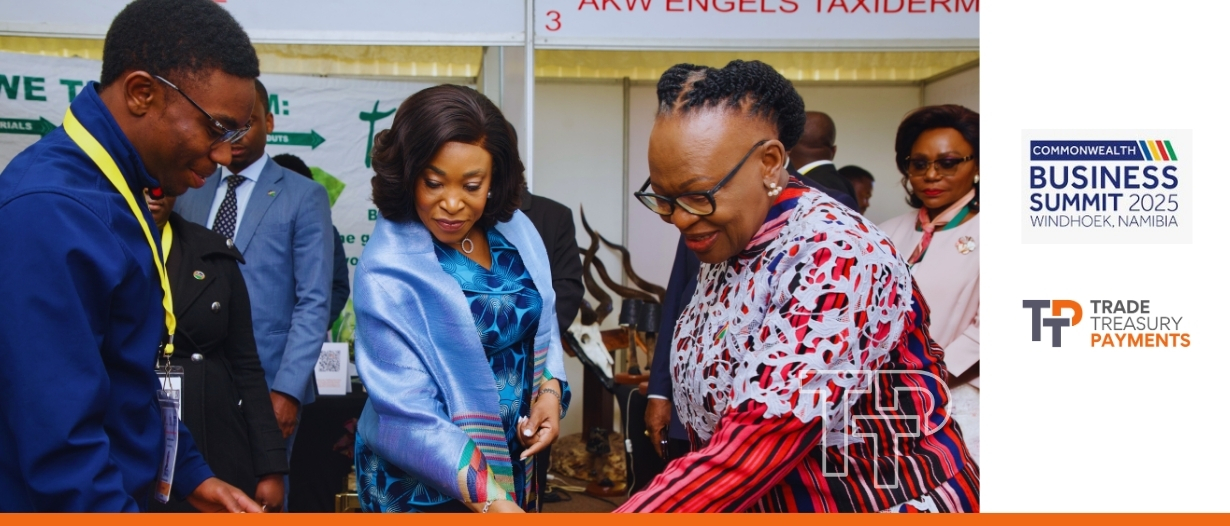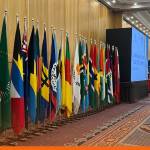Namibia hosts the first-ever Commonwealth trade ministers meeting and business summit
Deepesh Patel
Jun 16, 2025
 Devanshee Dave
Jun 19, 2025
Devanshee Dave
Jun 19, 2025

In the current global trade scenario, which is characterised by unpredictability, volatility, and uncertainty, the Commonwealth family of nations is charting a bold path toward economic resilience through strengthened trade and investment linkages. The 23rd Dr. Theo-Ben Gurirab Public Lecture at the Namibia University of Science and Technology became the stage for this vision.
This is the first time that the Commonwealth Trade Ministers Meeting has ventured beyond London’s borders, landing on African soil and signalling a new era for the 56-nation alliance. This milestone affirms the Commonwealth’s commitment to regional engagement and inclusivity.
This gathering coincides with Namibia’s own economic recalibration under President Netumbo Nandi-Ndaitwah, the country’s first female president, who deliberately merged the Ministry of International Relations with International Trade to accentuate economic diplomacy in international relations.
However, the question is, how do trade linkages lead to resilience in a time when protectionism is rising globally and supply chains are being disrupted? Here is what the lecture on “Fostering Resilience: Strengthening Intra-Commonwealth Trade and Investment Linkages” says about it, which included speakers, Namibia’s Minister of International Relations and Trade, Hon. Selma Ashipala-Musavyi, and Commonwealth Secretary-General Hon. Shirley Ayorkor Botchwey.
As Secretary-General Botchwey articulated, trading within the Commonwealth costs 21% less than with non-member countries. This advantage stems from its foundation, which includes shared historical ties, common languages across 56 nations, similar legal systems, and compatible administrative practices. These cultural connections function as economic multipliers, reducing friction and costs when doing business across Commonwealth borders.
For 2.7 billion Commonwealth citizens, this means real savings and expanded opportunities.
During her address, she also introduced her ambitious plan, stating, “Our goal is bold but achievable – to demonstrate that trade and investment within the Commonwealth can transform our economies and sustain the resilience needed for each Commonwealth citizen to enjoy the democratic dividend.” To transform this vision into reality, Botchwey announced a concrete target: growing intra-Commonwealth trade to US$2 trillion by 2030.
The current US$883 billion, while substantial, represents just the beginning of what’s possible. “Promising, but not enough,” as Botchwey explained. “We must move faster and smarter,” she urged, outlining the practical steps needed: “investing in connectivity, not just capacity, simplifying rules, expanding digital corridors, and closing the trade finance gap.”
Namibian Minister Ashipala-Musavyi echoed this sentiment with, “We must work together, Commonwealth governments, businesses, academia, and civil society to remove trade barriers, improve market access, and ensure no member state is left behind, especially our Least Developed Countries and Small Island Developing States.”
Additionally, Ashipala-Musavyi emphasised how the Commonwealth’s vision finds a powerful example in Namibia and how it positions itself not merely as a meeting venue but as a strategic partner with unique assets. “Namibia, with its growing digital economy, abundant critical minerals resources, aspirations in renewable energy, including green hydrogen and nuclear energy, stands ready to engage and lead in these areas,” she explained.
Her vision goes beyond rhetoric: “These are not abstract concepts; they are concrete opportunities for Namibia to partner, innovate, and grow alongside fellow Commonwealth countries.” This is also evident from Namibia’s participation in multiple trade frameworks.
Namibia sits at a unique intersection through its involvement in the SACUM-UK Free Trade Agreement, SADC, SACU, and the AfCFTA. This multilayered trade network creates enhanced access to markets across Africa and beyond. For Namibia, as Secretary-General Botchwey noted, this strategic position means “shaping, not just joining, the global economy of tomorrow.”
The Commonwealth plans to support many such countries and shape their economic future, leading to enhanced global trade.
A recurring theme throughout the session was that strengthening trade is not merely about increasing numbers but ensuring inclusive prosperity. “Trade must work especially for our Micro, Small and Medium Enterprises, women entrepreneurs, and young people,” Secretary-General Botchwey stated, marking a shift from trade frameworks that have typically favoured established corporations.
With over 60% of Commonwealth citizens under 30, the Secretary-General highlighted youth as the Commonwealth’s “greatest asset” and outlined digital skills education and youth entrepreneurship as critical dimensions of the trade agenda.
These commitments are backed by practical mechanisms. The new Commonwealth Investment Network will “match credible projects with capital across our member states,” creating pathways for promising enterprises to access investment that was previously out of reach.
Namibia’s Minister Ashipala-Musavyi connected these goals to national priorities. Trade initiatives must deliver “real implications for job creation, climate resilience, and long-term development,” she emphasised, pointing to sectors like agriculture, youth empowerment, and creative industries that offer potential for inclusive growth.
However, the road to resilient intra-Commonwealth trade isn’t without obstacles. The combined impact of tariffs and non-tariff barriers, including overlapping standards and customs delays, severely hampers trade potential.
Addressing these barriers demands a multi-pronged approach, with Secretary-General Botchwey calling for “expanding digital corridors” and implementing “inclusive, digital-first trade policies” to reduce transaction costs. These digital initiatives will work alongside new measures to strengthen food and energy security through climate-resilient trade practices, particularly crucial for member states vulnerable to environmental shocks.
Minister Ashipala-Musavyi also stated that such ambitious reforms require unprecedented cooperation.
As the Commonwealth marks the 80th anniversary of the founding of the United Nations in 2025, words must now become deeds.
Concluding the Windhoek meeting, Minister Ashipala-Musavyi urged, “Let us build a Commonwealth of action, one that transforms challenges into opportunities for the next generation,” while Secretary-General Botchwey called for “a Commonwealth that is resilient, inclusive, and bold.” The future ahead is not just about fixing trade. It’s about future-proofing economies for generations to come.

Deepesh Patel
Jun 16, 2025

Bilal Bassiouni
Jun 12, 2025
Trade Treasury Payments is the trading name of Trade & Transaction Finance Media Services Ltd (company number: 16228111), incorporated in England and Wales, at 34-35 Clarges St, London W1J 7EJ. TTP is registered as a Data Controller under the ICO: ZB882947. VAT Number: 485 4500 78.
© 2025 Trade Treasury Payments. All Rights Reserved.